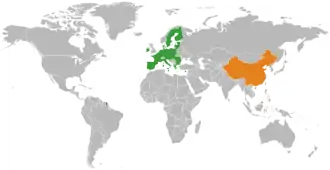Comprehensive Agreement on Investment
Comprehensive Agreement on Investment (CAI) is the name of a proposed investment deal between the People's Republic of China and the European Union. Proposed in 2013, the deal had not been signed as of 2020.[1] In December 2020, the EU announced that the agreement was concluded in principle; pending ratification by the European Parliament.[2]

Importance
The deal is "the most amibtious agreement that China has ever concluded" by significantly opening up its internal market to EU companies.[3] For example, China has agreed to eliminate joint venture requirements, forced transfer of technologies, equity caps, and quantitative restrictions in a number of sectors in which most of the EU's businesses in China operate.[3] It will also protect EU FDI in China.[3] In the manufacturing sector, where half of EU FDI is, China will "match the EU's openness"; a concession that had previously been unprecedented in Chinese trade or investment agreements, and which is viewed as a significant step towards market liberalisation in China.[3]
Controversies and debates
Especially among US analysts and politicians, the announcement sparked a "firestorm of criticism" towards the EU for not consulting the United States before.[4][5] The European Parliament has published a briefing in which the US' trade deal with China is mentioned as a reason for the EU seeking similar trade concessions from China, although "it is too early to judge whether the systemic issues tackled in the Trump Administration's 2020 US-China Phase One Deal will actually be enforced", and "it will be a tall order for the EU to obtain far-reaching concessions from China in the CAI negotiations."[6] Critics, including a few lawmakers and China watchers in Europe and the US, have accused EU leaders of being naive in agreeing to the deal or trusting China on issues such as sustainable development.[7][8]
Some analysts and diplomats say it may damage relations with the US as the EU hands China a political win at the expense of incoming president Joe Biden.[9][7] In December 2020, Jake Sullivan, Biden's national security adviser, said he would welcome "early consultation" with Europe on China. Nevertheless, instead of holding off for Biden to take office to devise a common approach toward China, the EU agreed to the deal anyway.[8] Biden has argued that with his administration, the US is "at the head of the table again", which, according to some Europeans, might be viewed as a hurdle for the continent to flex its autonomous muscles on the world stage by expecting the EU to go back to the status quo ante and "play second-fiddle to Washington".[10]
The EU retorted that the US-China Phase One Trade Deal, which the Biden administration has vowed to continue, has given America advantages over the EU in terms of trade and investment with China.[10] Brussels insisted that it is merely striving for similar benefits to those established in US-China trade deal.[11] Valdis Dombrovskis, the EU's trade comissioner, has argued that CAI will prevent EU companies from being put at a disadvantage by the US-China trade deal.[10] He did not see the signing of either trade deal as hindering the co-operation between the EU and the US.[11]
In December 2020, France said it will oppose the proposed agreement between the EU and China over the use of forced labour of Uyghurs.[12][13] In January 2021, France's junior minister for trade Franck Riester said that France "will sign, the European Union will sign [the investment agreement] with the provision noted in the text, which is to make sustained and continuous efforts for ratification" of an International Labour Organization convention banning forced labour.[14]
See also
References
- "What is the China-EU CAI and how is it different from a trade deal?". South China Morning Post. 2020-12-24. Retrieved 2021-01-11.
- European Commission (2020-12-30). "EU and China reach agreement in principle on investment".
- European Commission (2020-12-30). "Key elements of the EU-China Comprehensive Agreement on Investment".
- "In defense of the EU-China investment deal". POLITICO. 2021-01-08. Retrieved 2021-01-11.
- "Europe's Disgraceful Betrayal". National Review. 2020-12-31. Retrieved 2021-01-11.
- European Parliament (September 2020). "EU–China Comprehensive Agreement on Investment: Levelling the playing field with China" (PDF).
- "Cynicism explains a flawed new EU-China commercial pact". The Economist. 7 January 2021. Retrieved 14 January 2021.
- "Europe's Contested Deal With China Sends Warning to Joe Biden". Bloomberg News. January 8, 2021. Retrieved January 15, 2021.
- Erlanger, Steven (2021-01-06). "Will the Sudden E.U.-China Deal Damage Relations With Biden?". The New York Times. ISSN 0362-4331. Retrieved 2021-01-11.
- Hutt, David (2020-12-31). "EU-China deal may give Biden's team more options".
- Brunsden, Jim; Peel, Michael; Fleming, Sam (December 30, 2020). "What is in the EU-China investment treaty?". Financial Times. Retrieved February 3, 2021.
- "France opposes EU-China deal on Uyghur abuse". FR24 News. 23 December 2020.
- "Paris will block EU-China deal, says trade minister". POLITICO. 23 December 2020.
- "EU will not ask China to sign forced labor ban before ratifying investment deal, says French minister". POLITICO. 12 January 2021.